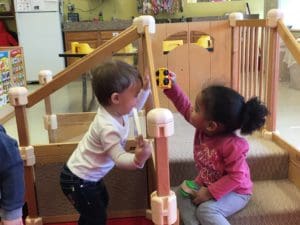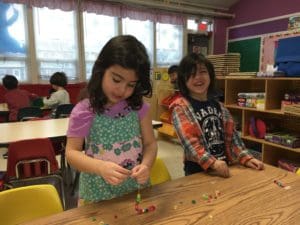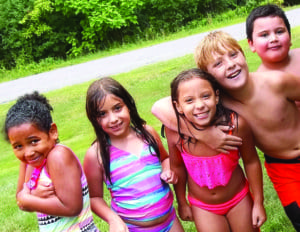After all these years, I still remember my first day of preschool. Don’t we all sometimes wish to return to the simpler days of naptime, coloring, and Dr. Seuss? Imagine starting your child off at the right daycare in Paramus, NJ. After all, “The more that you read, the more things you will know. The more that you learn, the more places you’ll go.” Prime Time Paramus is a daycare where a dedicated team of caretakers and teachers share a mission to enhance the physical, socio-emotional, cognitive, and communicative abilities of children from the young age of 6 weeks to 10 years old. Kids can be educated within their preschool, child care, day care, after school, and summer camp programs. At the new Paramus center, each second playing, laughing, or napping is a prime moment for a child to learn about him or herself and the world around them.
Founded by Ricci Wasserman in 1982, the heart of the program at Prime Time is the staff. Each educator fulfills the requirements to be a lead teacher within the state of New Jersey. Kids learn from teachers with college degrees and years of professional experience, many of whom are backed by their personal parenting experiences. The caretakers at Prime Time Paramus take pride in investing their time into children’s learning and personal development. Facilitators utilize their unique curriculum, Prime Connections, which is a holistic learning philosophy employing interests of children into full learning. The curriculum follows the rapid growth of infants into preschoolers, continuing with an after school and summer camp program for older kids.
What is unique about Prime Time is their integration of technology to include their parents in their kids’ experience. How many times do you ask your kid, “What did you do at school today?” only to be followed by a reply along the lines of, “I don’t know.” To keep parents involved, Prime Time uses the PreSchool2Me App which sends photos and reports to parents every day. Whether you are the parent of a 10-week-old who wants updates on when your baby is awake or a 10-year-old going on a fun field trip, you can stay in touch with your child’s activity.
 Prime Time for Infants:
Prime Time for Infants:
Each family is assigned a primary child caregiver to develop a specific routine and schedule based on home practices and values. From the moment the infant is dropped off at the center, the caregiver enters a relationship that fosters trust and serves the baby’s individual needs. Prime Time practices safe sleep provisions for the infants to be placed on their backs to sleep with a blanket and pacifier. Caregivers are aware of when the baby shows signs of hunger. While parents provide instructions on when to feed the baby, seasoned caregivers can designate time for mothers to breastfeed or work with parents on the transition from liquid to solid foods.
Babies tune into their senses and learn with their bodies and brain in coordination. Even when unable to speak, they acquire language by hearing it, hence why the babies are sung and spoken to throughout the day. During play time, the young infants play with soft objects while lying on their backs and flip over for “tummy time” to develop core and upper body strength. When weather permits, the babies are strolled around the outside playground to familiarize themselves with the center’s outdoor space.
 Prime Time for Toddlers:
Prime Time for Toddlers:
Toddlers at Prime Time learn in a variety of places and group settings. Their curriculum, also known as the Early Learning Curriculum is designed around center-based learning which dedicates two periods a day for a variation of math, reading, art, or science. Teachers and students also gather in a small group session for group reading or specific projects. Toddlers also develop social skills in a larger group setting when the teacher gathers the class to listen to music or hold a discussion. Toddlers are given more freedom to socialize during their scheduled outside time. While activity and lessons are crucial to the curriculum, a quick afternoon nap also plays a role in brain development.
 Prime Time for Preschool:
Prime Time for Preschool:
Preschool students under Prime Time Paramus also learn in an environment surrounded by their peers and technology. The students learn to use tablets and take advantage of the curated, animated apps to facilitate learning. The preschool curriculum develops from the toddler early learning program to increase the toddler’s independence. Improved social communication and friendships develop from the preschool experience at Prime Time. Students develop the physical capacity to write names of friends, draw pictures, and dress themselves. Voluntary exercise and healthy practices become everyday habits contributing to future enjoyment of little leagues and dance classes. Kids who attend Prime Time become comfortable and attentive in a classroom setting.
 Prime Time spent After School:
Prime Time spent After School:
After kids move into traditional local schooling, they still have the opportunity to spend afternoons in the Prime Time environment. Children may be dropped off at the center location or even picked up by staff members when the school bell rings at the end of the day. While parents are at work, students can participate in homework clubs with the full assistance of trained educators. When finished with their schoolwork, children can socialize with supervised play, group games, and playground time.
Prime Time for Summer Camp:
When school ends for the summer, Prime Time Summer Camp picks up activities where schools have left off. Camp calendars and weekly themes are implemented and organized by age groups. Hours spent at Prime Time Paramus are loaded with arts and crafts, athletics, and guest performances. Time is not exclusive to local activities, but extends to adventures at fun field trips.


